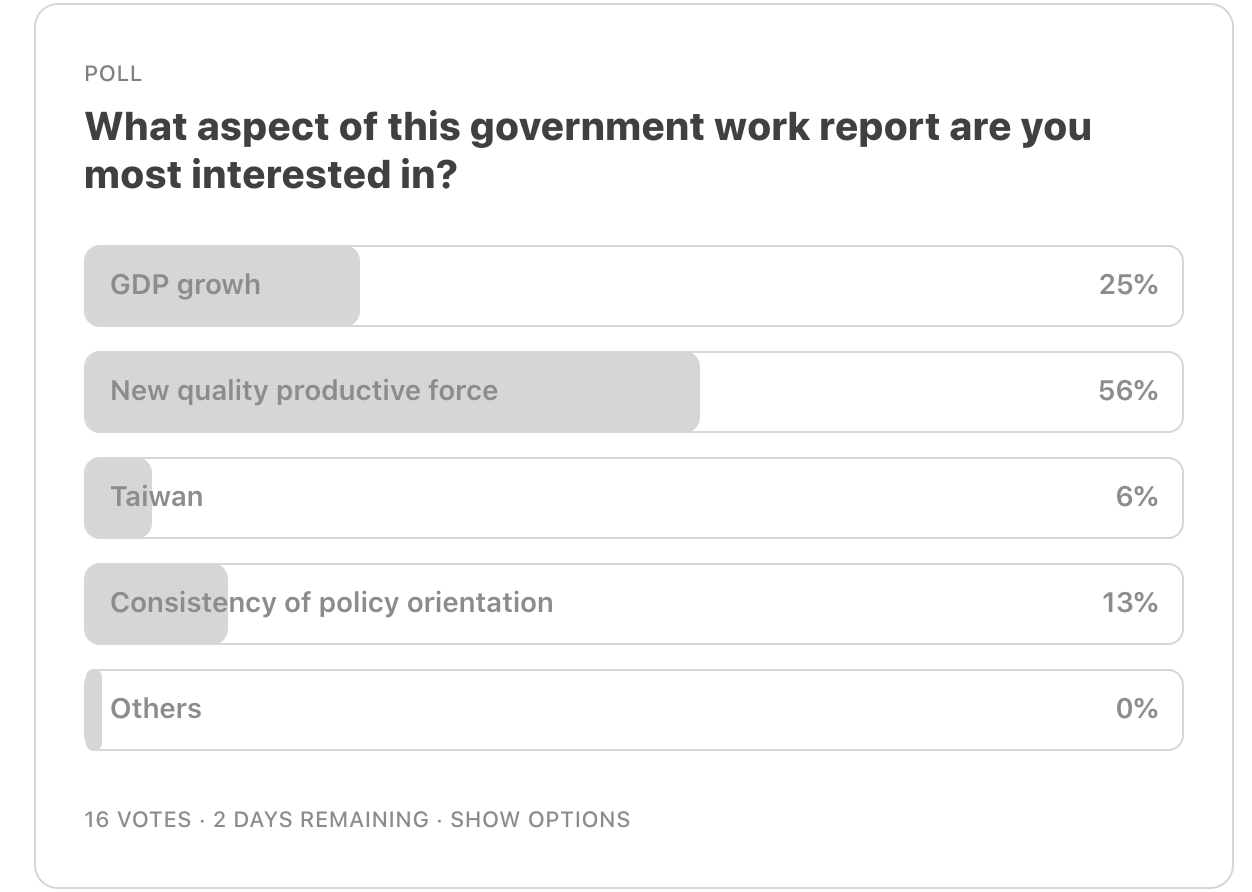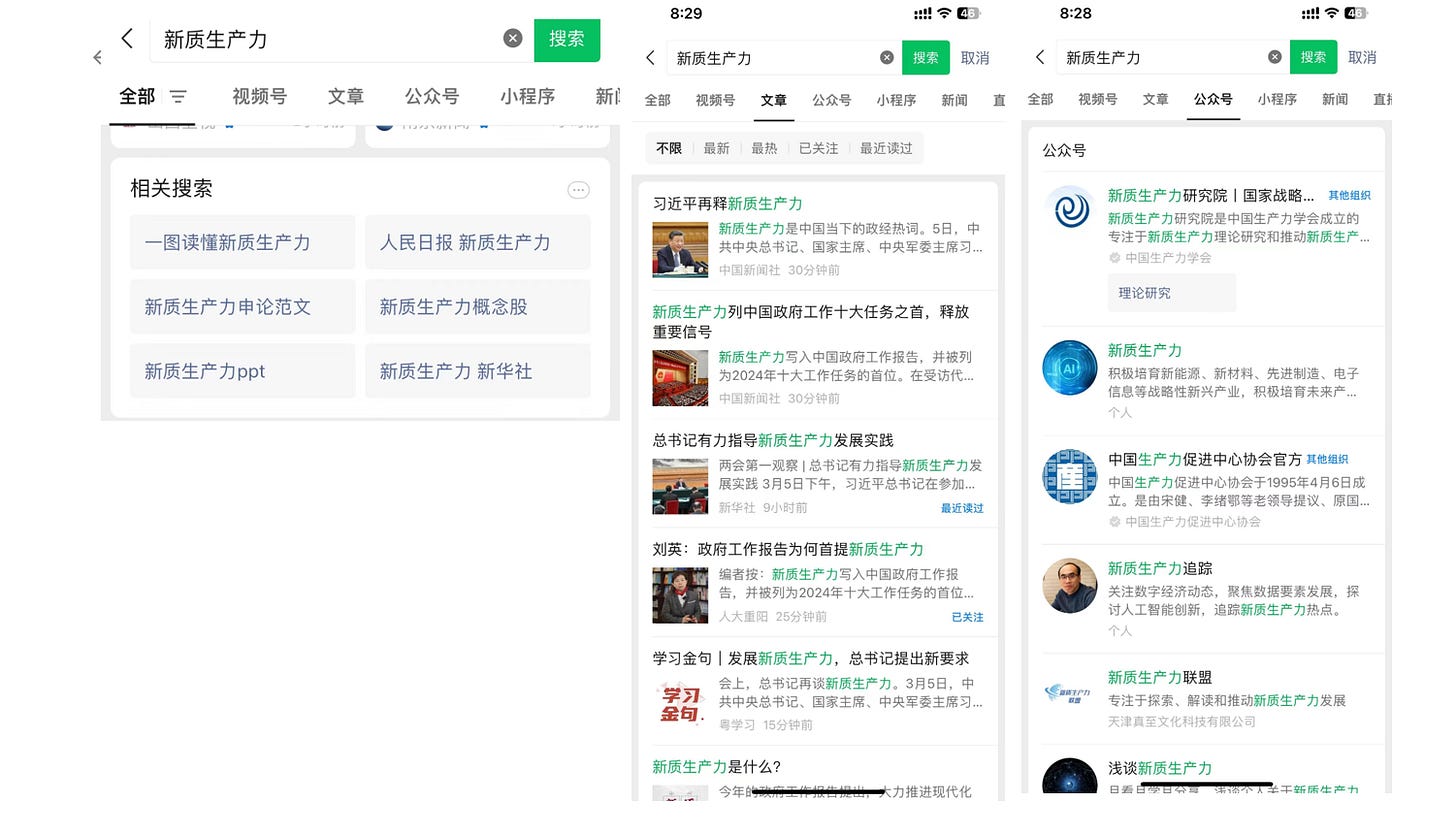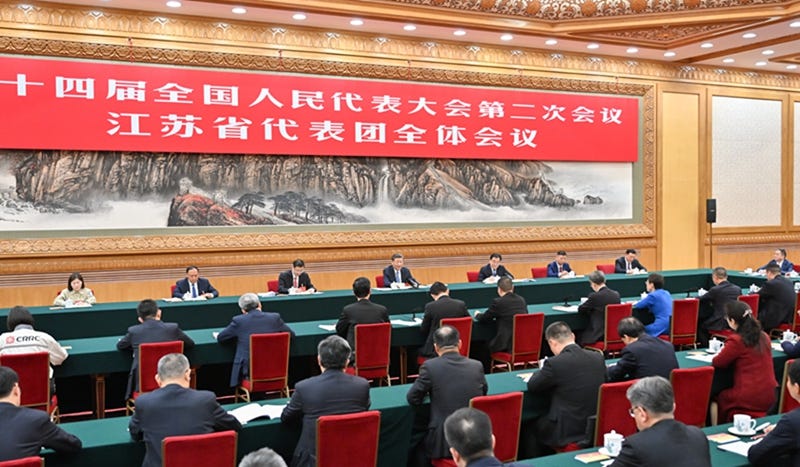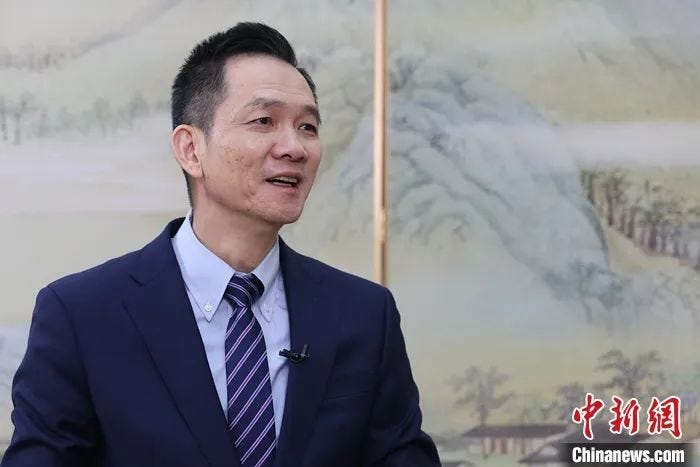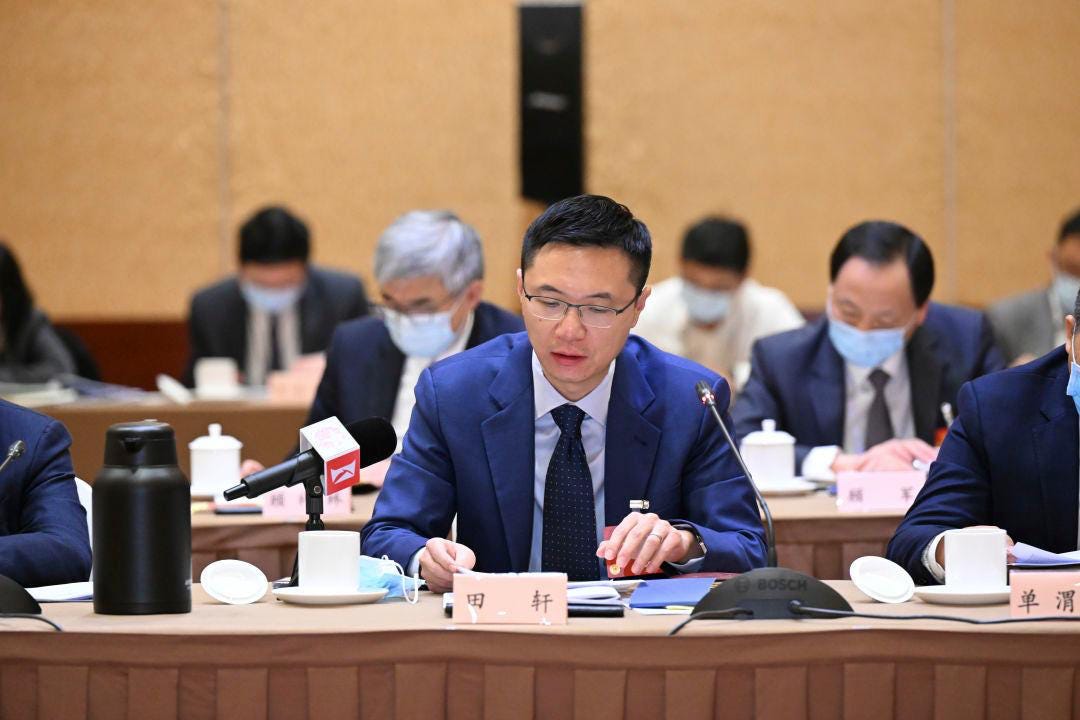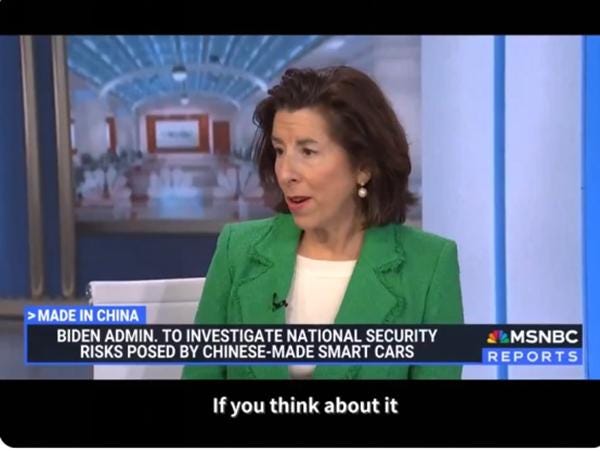Xi Jinping's "new quality productive forces": Meaning, significance, and implementation
And a full-text readout on Xi Jinping's key remarks on Tuesday
In the past two days, GRR has posted the agenda, daily schedule of Two Sessions 2024, and the full-text & highlights of government work report, which outlines China's main development targets for the coming year.
In the poll at the end of our last post, the new buzzword 新质生产力 "new quality productive force" was revealed to be of the greatest interest among our readers, which also happened to be the key theme of President Xi Jinping's remarks made during Tuesday's deliberation of the delegation of Jiangsu Province at the second session of the 14th National People's Congress (NPC).
If you search for "new quality productive forces" on the WeChat blog platform (a platform in China similar to Substack for posting and sharing articles), you will find that many media outlets are reporting on this term. In the search suggestions, there are related slides, stocks, and even model essays for this topic related to the Chinese civil service exam, as well as at least five WeChat blogs with name related to the term.
So the first part of today's piece focuses on exploring the key term "new quality productive forces" by looking at Xi's comments on it, a recent interview of Prof. Yao Yang, director of China Center for Economic Research at Peking University, and an article by Tian Xuan, Associate Dean and Chair Professor of Finance at PBC School of Finance at Tsinghua University, who is also a deputy to the 14th NPC.
The second part is a translation of the full-text readout on Xi's remarks during the deliberation with his fellow deputies from the delegation of Jiangsu Province on Tuesday with some GRR's notes.
Some of you might be curious about why Xi engaged in discussions with fellow lawmakers from east China’s Jiangsu Province for two consecutive years (see our post covering that last year). It is because Xi was elected deputy to the 14th NPC by a vote at the first session of the 14th Jiangsu Provincial People's Congress in 2023, so it is natural for him to be with the Jiangsu delegation in 2023 and 2024, and I believe he would continue attending the deliberations of Jiangsu delegation in the coming years.
Part 1 "New quality productive forces"
1. Xi Jinping's remarks on "new quality productive forces"
When attending the deliberation of the delegation of Jiangsu Province at the second session of the 14th NPC, Xi stressed 因地制宜发展新质生产力 developing new quality productive forces according to local conditions. The following is the opening part of the readout stressing on "new quality productive forces".
中共中央总书记、国家主席、中央军委主席习近平5日下午在参加他所在的十四届全国人大二次会议江苏代表团审议时强调,要牢牢把握高质量发展这个首要任务,因地制宜发展新质生产力。面对新一轮科技革命和产业变革,我们必须抢抓机遇,加大创新力度,培育壮大新兴产业,超前布局建设未来产业,完善现代化产业体系。发展新质生产力不是忽视、放弃传统产业,要防止一哄而上、泡沫化,也不要搞一种模式。各地要坚持从实际出发,先立后破、因地制宜、分类指导,根据本地的资源禀赋、产业基础、科研条件等,有选择地推动新产业、新模式、新动能发展,用新技术改造提升传统产业,积极促进产业高端化、智能化、绿色化。
Xi emphasized the need to firmly focus on the primary task of high-quality development, and develop new quality productive forces according to local conditions.
Facing the latest round of scientific and technological revolutions and industrial transformations, we must seize opportunities and step up efforts to make innovations, he said.
We must also cultivate and strengthen emerging industries, arrange the development of industries for the future in advance, and modernize industrial system. To develop new quality productive forces doesn’t mean ignoring or abandoning traditional industries. The endeavors in this regard should never be in a mad scramble, and bubbles should be prevented. We should also avoid the domination of a single model, he said.
Localities should adhere to the principle of proceeding from reality, building the new before discarding the old, taking measures in line with local conditions, and giving differentiated guidance. They must selectively cultivate new industries, business models and growth drivers in the light of their resource endowment, industrial foundation and scientific research conditions, among other factors. They must transform and upgrade traditional industries with new technologies and take rigorous actions to make industries higher-end, smarter, and more environmentally friendly.
"New quality productive forces" as a key term in recent top-level meetings
According to a Xinhua explainer and a Xinhua article on Wednesday with more details about Xi's remarks in the deliberation, the term "new quality productive forces" was first introduced in September in 2023 by Xi during an inspection and research trip, was highlighted again at the Central Economic Work Conference in December, and became the subject of the first group study session held by the Political Bureau of the Communist Party of China (CPC) Central Committee this year. When it comes to the Two Sessions period this year, the term is highlighted in this year's government work report as the first one among the "top ten priorities" of government work in 2024.
Definition given by Xi
With innovation playing the leading role, new quality productive forces mean advanced productivity that is freed from traditional economic growth mode and productivity development paths, features high-tech, high efficiency and high quality, and comes in line with the new development philosophy.
How does the term relate to China's push for scientific and technological innovation, comprehensive reforms, and the development of Jiangsu Province?
According to the Xinhua article mentioned above, Xi has made clear requirements regarding the development of new quality productive forces, which can be summarized as follows:
1. Relationship between scientific and technological innovation and new quality productive forces
Scientific and technological innovation is a key element in developing new quality productive forces. When the fruits of scientific and technological innovation are timely applied to specific industries and industrial chains, and modern industrial systems are perfected, the chain between scientific and technological innovation, industrial innovation and the development of new quality productive forces will become fully jointed.
2. Relationship between new quality productive forces and comprehensively deepening reforms
Developing new quality productive forces requires advancing comprehensively deepening reforms and forming new types of productive relations suited to the new situation. With reforms to break through bottlenecks, the development of new quality productive forces will be freed from fetters, enabling innovations and technological inventions to mushroom.
3. The important role of major economically developed provinces in developing new quality productive forces
Jiangsu, as one of the major economically developed provinces, shall be made a major locality for the development of new quality productive forces. Xi stresses the imperative for Jiangsu to “build interconnected innovation, industrial, and supply chains in a broader range of areas, so that Jiangsu can better leverage its strength to drive the development of the whole region and the whole country”, which sufficiently highlights the important responsibility shouldered by major economically developed provinces like Jiangsu, in the development of new quality productive forces.
Insights on the term from two experts
Yao Yang, Professor, Director of China Center for Economic Research at Peking University, explains in an recent interview conducted by China News Service that new quality productive forces are productivity that is able to raise the 全要素生产率 Total Factor Productivity (TFP), which is key for China's economy to transition from a phase of rapid growth to a stage of high-quality development. [Listen to a GRR's podcast show with Prof. Yao discussing China's economy in transition]
[Note: TFP is calculated by dividing output by the weighted geometric average of labor and capital input, with the standard weighting of 0.7 for labor and 0.3 for capital. It refers to how efficiently a country or business uses all of its resources—like labor, machinery, and technology—to produce goods and services. It's like measuring how well a chef uses all the ingredients in the kitchen to make a meal, not just how many ingredients they have. If TFP is high, it means the economy is using its resources very effectively to grow and innovate.]
Prof. Yao Yang:
For a long time in the past, the improvement of TFP in China primarily relied on reforms. Going forward, to enhance TFP, we need to increase investment in science and technology and improve technological levels and innovation capabilities.
Regarding economic growth, there is a fundamental model called the Solow Model. This model suggests that a country's economic growth will eventually reach a so-called steady state. At this steady state, the rate of progress in a country's per capita income is equal to the rate of technological advancement; when a country has not reached this steady state, the increase in per capita income can still rely on capital accumulation. China has not yet reached this steady state, but the proportion of capital accumulation will become increasingly lower, and the share of technological progress must increase.
Assuming that by the middle of this century, China reaches a steady state, the growth in per capita income will have to rely entirely on technological progress. We are currently in a transition period, so it is crucial to strive for technological advancement. The path of high-quality development formulated by the central government is designed to serve this transformation.
Tian Xuan, Associate Dean and Chair Professor of Finance at PBC School of Finance at Tsinghua University and a deputy to the 14th National People's Congress, elaborates on China's economic transitioning phase when answering why developing new quality productive forces at a faster pace replaced expanding domestic demand listed as the top one task in this year's government report in a recent article:
经过多年快速发展,我国经济长期积累的结构性体制性矛盾仍然突出,经济增长方式粗放问题仍然严重,投资规模增长过快,有效需求特别是居民消费需求不足,为了适应高质量发展阶段质量第一、效益优先的新要求,必须改变过去传统生产力条件下依靠大量资源投入、高度消耗的发展方式,由不可持续性向可持续性转变,由粗放型向集约型转变。
With the structural and institutional problems accumulated during years of rapid development still prominent, the consequences, including excessive investment, particularly a lack of effective demand, notably in domestic consumption, still persist. To put quality first and give priority to performance in the high-quality development stage, there is a need to abandon the past development model that relies heavily on resource-intensive and unsustainable practices and transition to a sustainable model.
In terms of external factors, he adds that to tackle challenges in global development accompanied by geopolitical risks, especially with the ongoing risk of decoupling from China by Western countries, there is a fundamental need for a transformation in productivity with new quality productive forces.
“The ongoing risk of decoupling from China by Western countries” mentioned by Prof. Tian reminds your Ginger River of the argument between the U.S. Secretary of Commerce and the spokesperson for the China's Foreign Ministry on the issues of technological decoupling and national security.
Mao Ning, a spokesperson for China's Foreign Ministry, made these remarks after US Commerce Secretary Gina Raimondo said in a recent interview with US media outlet MSNBC that "cars these days are like an iPhone on wheels… You connect your phone and you might receive the text message… Imagine a world with 3 million Chinese vehicles on the roads of America, and Beijing can turn them off at the same time."
Mao said that by that logic, shouldn't China be more worried about Washington's ability to get hundreds of millions of Apple phones of Chinese users to channel collected information back to the US, or even cause a blanket screen shutdown?
Tian Xuan, as an expert in the financial sector, further discussed the efforts he believes are needed to develop new quality productive forces.
从金融的角度看,我的学术研究发现,激励创新需要容忍失败的文化氛围,需要崭新的创投组织形式,需要正确的人力资源政策,需要“不太积极”的二级市场、健康开放的资本市场和稳定的宏观政策导向组成的一整套“组合拳”去激励企业技术创新。
From a financial perspective, my academic research has found that incentivizing innovation requires a culture that tolerates failure, new forms of venture capital organizations, correct human resource policies, and a "combo" of a "less aggressive" secondary market, a healthy and open capital market, and stable macroeconomic policy orientations to stimulate corporate technological innovation.
...
充分发挥天使投资、风险投资、私募股权等创业投资力量对基础研究、应用研究、科技转化等创新活动的支持,支持创业投资机构深度参与企业发展和治理过程,为优质企业提供发展所需的知识、人才、专业技能等,提升企业经营水平。
It is crucial to fully leverage the power of startup investments such as angel investment, venture capital, and private equity in supporting innovation activities in basic research, applied research, and technology transfer. Support for venture investment institutions to deeply participate in the development and governance processes of enterprises is necessary, providing high-quality businesses with the knowledge, talent, and professional skills needed for development, thereby enhancing the operational level of enterprises.
Happy to see a deputy to the NPC emphasizing the importance of the venture capital industry. I know that in the past two years, doing venture capital in China has not been that easy, and it is also facing transformation. [Check out my YouTube channel show filming a typical day in the life of a Chinese venture capitalist.]
Part 2 Full-text readout of Xi's remarks on Tuesday
The following is the English translation of the full readout of Xi's important remarks made on Tuesday.
习近平在参加江苏代表团审议时强调 因地制宜发展新质生产力
Xi stresses developing new quality productive forces according to local conditions
中共中央总书记、国家主席、中央军委主席习近平5日下午在参加他所在的十四届全国人大二次会议江苏代表团审议时强调,要牢牢把握高质量发展这个首要任务,因地制宜发展新质生产力。面对新一轮科技革命和产业变革,我们必须抢抓机遇,加大创新力度,培育壮大新兴产业,超前布局建设未来产业,完善现代化产业体系。发展新质生产力不是忽视、放弃传统产业,要防止一哄而上、泡沫化,也不要搞一种模式。各地要坚持从实际出发,先立后破、因地制宜、分类指导,根据本地的资源禀赋、产业基础、科研条件等,有选择地推动新产业、新模式、新动能发展,用新技术改造提升传统产业,积极促进产业高端化、智能化、绿色化。
Xi Jinping, General Secretary of CPC Central Committee, took part in the deliberation of the government work report with his fellow deputies from the delegation of Jiangsu Province to the second session of the 14th National People’s Congress on the afternoon of March 5.
He emphasized the need to firmly focus on the primary task of high-quality development, and develop new quality productive forces according to local conditions. Facing the latest round of scientific and technological revolutions and industrial transformations, we must seize opportunities and step up efforts to make innovations, he said. We must also cultivate and strengthen emerging industries, arrange the development of industries for the future in advance, and modernize industrial system. To develop new quality productive forces doesn’t mean ignoring or abandoning traditional industries. The endeavors in this regard should never be in a mad scramble, and bubbles should be prevented. We should also avoid the domination of a single model, he said.
Localities should adhere to the principle of proceeding from reality, building the new before discarding the old, taking measures in line with local conditions, and giving differentiated guidance. They must selectively cultivate new industries, business models and growth drivers in the light of their resource endowment, industrial foundation and scientific research conditions, among other factors. They must transform and upgrade traditional industries with new technologies and take rigorous actions to make industries higher-end, smarter, and more environmentally friendly.
According to the readout, six deputies shared their opinions on various issues in the delegation's panel deliberation:
江苏代表团审议热烈,气氛活跃。崔铁军、高纪凡、宋燕、吴惠芳、吴新明、孙景南等6位代表分别就实现高水平科技自立自强、推动中国光伏行业高质量发展、加强文化遗产保护传承、建设共同富裕的幸福村、服务长三角一体化发展、弘扬工匠精神等问题发言。习近平不时插话,同大家交流。
The deliberation was carried out in a warm and lively atmosphere within the delegation. Cui Tiejun, Gao Jifan, Song Yan, Wu Huifang, Wu Xinming and Sun Jingnan, six deputies of the delegation, presented on how to achieve great self-reliance and strength in science and technology, promote the high-quality development of the country’s photovoltaic industry, strengthen the protection and inheritance of cultural heritage, build happy villages featuring common prosperity, support the integrated development of the Yangtze River Delta, and promote craftsmanship. Xi joined their talks from time to time, exchanging opinions with his fellow deputies.
After summarizing the deputies’ topics, the readout continues with Xi’s comments on Jiangsu Province:
在认真听取大家发言后,习近平作了发言。他首先表示赞成政府工作报告,充分肯定江苏经济社会发展取得的新进展,新成效,希望江苏坚定信心,鼓足干劲,勇挑大梁,为全国大局做出更大贡献。习近平强调,江苏发展新质生产力具备良好的条件和能力,要突出构建以先进制造业为骨干的现代化产业体系这个重点,以科技创新为引领,统筹推进传统产业升级、新兴产业壮大、未来产业培育,加强科技创新和产业创新深度融合,巩固传统产业领先地位,加快打造具有国际竞争力的战略性新兴产业集群,使江苏成为发展新智生产力的重要阵地。
After listening to the deputies’ presentations, Xi delivered a speech. He expressed his approval of the government work report, fully acknowledging the new progress and achievements made in Jiangsu’s economic and social development. He expressed the hope that Jiangsu will have greater confidence, exert its utmost, and shoulder greater responsibilities to make even more contributions to the nation.
Xi stressed that Jiangsu possesses favorable conditions and capabilities for developing new quality productive forces. He highlighted the importance of building a modern industrial system with advanced manufacturing as the mainstay.
It is essential for technological innovation to play a leading role in coordinating the upgrading of traditional industries, the expansion of emerging industries, and the nurturing of industries for the future. It is imperative to intensify the integration between technological innovation and industrial innovation, and reinforce the leading edge of traditional industries. It is important to accelerate the building of internationally competitive clusters of strategic emerging industries, and make Jiangsu a major locality for the development of new quality productive forces.
Xi's election in Jiangsu as a deputy to the 14th NPC, according to analysts, reflects the emphasis from the nation's top leadership on advancing the Chinese path to modernization, furthering the integrated growth of the Yangtze River Delta and ensuring self-reliance in science and technology, reported by China Daily.
A Global Time article gives a review of Jiangsu as a national economic powerhouse
As a national economic powerhouse, east China's Jiangsu Province saw its regional gross domestic product (GDP) increase by 5.8 percent year-on-year to 12.82 trillion yuan (about 1.8 trillion U.S. dollars) in 2023, according to the annual session of the provincial people's congress in January. This figure means the province contributed the second-highest GDP in China in 2023 only following south China's Guangdong Province with 13.57 trillion yuan (about 1.9 trillion U.S. dollars).
Apart from the impressive figures, Jiangsu people's undeniable business acumen plays a vital role in continuously pushing the province to explore new areas aligned with the demand of national strategies and the market.
In 2023, the output value of new energy vehicles (NEVs) and new energy industries in Jiangsu increased by 19 percent and 14.5 percent respectively. The production of lithium-ion batteries for automobiles increased by 18.7 percent. Monocrystalline silicon production increased by 31.6 percent, photovoltaic cell production increased by 45.6 percent, NEV production increased by 46.3 percent, wind power generator production increased by 66.4 percent, and charging pile production increased by 1.3 times, according to Xinhua.
In the next part of the readout, Xi calls for further reforms on all fronts to provide impetus for advancing Chinese modernization.
习近平指出,要谋划进一步全面深化改革重大举措,为推动高质量发展,推进中国式现代化持续注入强劲动力。围绕构建高水平社会主义市场经济体制,加快完善产权保护、市场准入、公平竞争、社会信用等市场经济基础制度。完善落实两个毫不动摇的体制机制,支持民营经济和民营企业发展壮大。激发各类经营主体的内生动力和创新活力。深化科技体制、教育体制、人才体制等改革,打通束缚新质生产力发展的堵点、卡点,持续建设市场化、法治化、国际化一流营商环境,塑造更高水平开放型经济新优势。
Xi pointed out the necessity of planning major measures to further deepen reform on all fronts, so as to continuously inject strong impetus into the endeavor to promote high-quality development and advance Chinese modernization.
To build a high-level socialist market economy, it is imperative to accelerate the improvement of basic systems underpinning the market economy such as those for property rights protection, market access, fair competition, and social credit. It is essential to improve and implement the institutions and mechanisms to unswervingly consolidate and develop the public sector and unswervingly encourage, support and guide the development of the non-public sector, facilitate the growth of the private sector and private enterprises, and stimulate the endogenous power and innovation vitality of various business entities.
Reform of systems involving science and technology, education and professional personnel should be deepened, and barriers obstructing the development of new quality productive forces should be removed. Efforts should be continued to create a world-class business environment that is market-oriented, law-based and internationalized to foster new strengths for a higher-level open economy.
What does "further deepen reform on all fronts" mean? Those interested may take a look at a recent post by Zichen Wang’s Pekingnology about "deepening reform" as I know many of you are expecting the opening of the third plenum of the 20th CPC Central Committee.
Then, this is the part where Xi called on Jiangsu to fully integrate into and contribute to the development of the Yangtze Economic Belt and the integrated development of the Yangtze River Delta.
习近平强调,党的十八大以来,我们实施了一系列区域协调发展战略,区域重大战略、主体功能区战略等,为构建新发展格局,推动高质量发展发挥了重要支撑作用。江苏要全面融入和服务长江经济带发展和长三角一体化发展战略,加强同其他区域发展战略和区域重大战略的对接,在更大范围内联动构建创新链、产业链、供应链,更好发挥经济大省对区域乃至全国发展的辐射带动力。
Xi stressed that since the 18th CPC National Congress in 2012, a series of coordinated regional development strategies, major regional strategies and functional zoning strategies have been implemented, playing an important supporting role in fostering a new development paradigm and promoting high-quality development.
It is imperative for Jiangsu to fully integrate into and contribute to the development of the Yangtze Economic Belt and the strategy for integrated development of the Yangtze River Delta, and strengthen its alignment with the development strategies of other regions and major regional strategies to build interconnected innovation, industrial, and supply chains in a broader range of areas, so that Jiangsu can better leverage its strength as a major economically developed province to drive the development of the whole region and the whole country.
The readout continues to include Xi's urges to consolidate and strengthen the momentum of economic recovery, and to improve the Party's work.
习近平指出,要继续巩固和增强经济回升向好态势,提振全社会发展信心。党员干部首先要坚定信心,真抓实干。要巩固拓展主题教育成果,建立长效机制,坚决纠治形式主义,官僚主义,切实为基层减负,激发全党全社会创造活力,提振党员干部干事创业的精气神。要坚持以人民为中心的发展思想,在发展中稳步提升民生保障水平,引导激励广大群众依靠自己的双手创造幸福生活。
Xi pointed out that efforts must be made to sustain and reinforce the positive momentum of economic recovery, and boost confidence in development across society. Party officials should be among the first to have greater confidence and take concrete, effective actions. To consolidate and expand what has been achieved in theoretical study programs, efforts must be made to establish a long-term mechanism, resolutely rectify pointless formalities and bureaucratism, effectively reduce the burden on the grassroots, spark the creativity of the entire Party and society, and boost Party officials’ enterprising spirit in their work. The people-centered development philosophy should be upheld, and the people’s well-being should be steadily improved in the course of pursuing development, so as to guide and encourage the broad masses to create a happy life with their own hands.
In the last part of the readout, Xi stresses efforts to enhance people's well-being and ensure workplace safety.
习近平最后强调,要抓好安全生产,进一步做好安全隐患排查,强化预警监测,落实应急措施,保障人民群众生命财产安全。
Lastly, Xi stressed that it is important to ensure workplace safety by further improving the work to detect safety hazards, strengthening early warning and monitoring, and implementing emergency measures to ensure the safety of people’s lives and property.
中共中央政治局常委、中央办公厅主任蔡奇参加。
穆虹、姜信治等参加。
Cai Qi, a member of the Standing Committee of the Political Bureau of the CPC Central Committee and director of the General Office of the CPC Central Committee, participated in the deliberation.
Mu Hong and Jiang Xinzhi, among others, were present.




